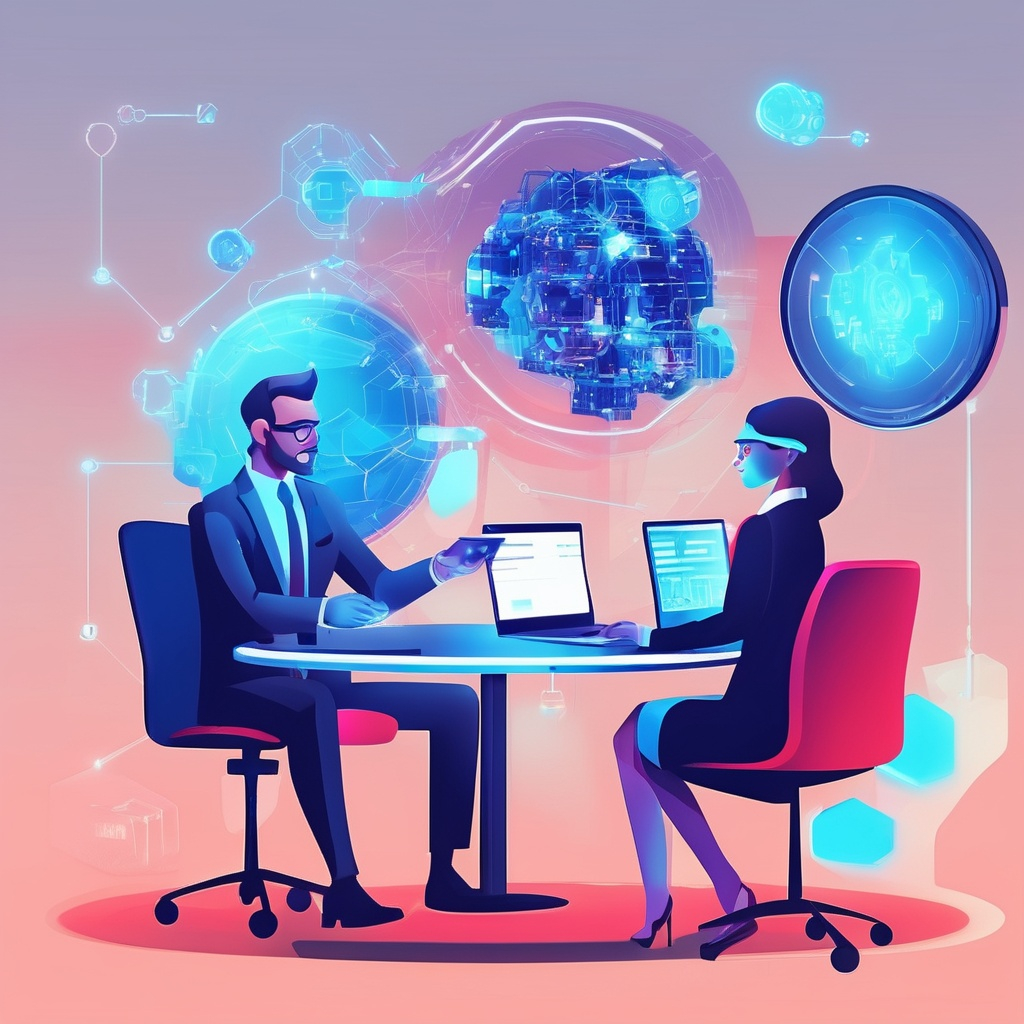Unleashing AI: The New Era of B2B Marketing and Sales
The rapid evolution of Generative and Agentic Artificial Intelligence is fundamentally reshaping the landscape of marketing and sales. AI will not only streamline traditional processes but also unlock new avenues for enterprise value creation and competitive advantage. AI’s impact will touch every job in marketing and sales. While many functions may be automated, new opportunities will emerge for professionals who can leverage AI’s breakthrough capabilities.
AI is modernizing marketing operations, driving measurable productivity gains, personalizing messaging, and speeding up high-quality content creation delivery by over 50%. The global AI Marketing market is projected to reach US$47.3 billion in 2025 and grow to <a href="https://www.kbvresearch.com/artificial-intelligence-in-marketing-market/" style=" font-weight: 600; color: #1D5327"$78.8 billion $78.8 billion by 2030.
Similarly, AI is a game-changer on the sales front. AI Sales tools typically deliver a 10–30% increase in conversion rates through predictive analytics, personalization, and automation. The global market for AI-enabled Sales solutions is projected to reach $57.9 billion in 2025 and is forecast to grow to $240.6 billion by 2030.
What follows is a perspective on how organizations can harness AI to accelerate B2B marketing and sales success, along with thoughts on what AI-enabled capabilities are on the near horizon.
Generative and Agentic AI-enabled Marketing Capabilities
The shift from product or service-driven marketing to Customer-Centric or Account-Based Marketing (ABM) is accelerating with AI. Generative and Agentic AI can assist businesses in automating their digital marketing while maintaining their ability to target specific audiences and personalize messaging and offerings based on firmographics, technographics, observed behaviors, and context-aware intent.
There are numerous existing AI-enabled Marketing tools evolving a variety of marketing functions that are poised for accelerated adoption
AI-Driven Content Creation Platforms
As of May 2025, an estimated 57% of B2B companies use Generative AI to create content.
- Tools like Jasper AI, ChatGPT-4, Copy.ai, and Synthesia provide automated content generation for blogs, social media posts, videos, and podcasts in real time. These tools can write in your brand voice ensuring brand consistency and can also adapt content for different platforms and audiences.
Hyper-Personalization & Predictive Anticipation
AI now powers hyper-personalized experiences, moving beyond basic segmentation and response to predictive anticipation where platforms dynamically adapt content, offers, change visuals and messaging in real-time based on user behavior, preferences, and even emotional state.
- Tools like Jasper.ai and Adobe’s personalization engines enable marketers to tailor content and product recommendations at scale, resulting in higher engagement and conversion rates. Dynamic Yield is a solution that delivers hyper-personalization across email, web, and applications.

Intelligent Campaign Management Systems
AI tools automate end-to-end campaign workflows, from A/B testing and multivariate analysis to budget allocation and real-time strategy adjustments.
- Solutions from Salesforce Einstein, Adobe Experience Platform, and HubSpot provide comprehensive campaign automation, from budget allocation and predictive performance modeling to real-time optimization and reporting. Omneky uses AI agents to launch and optimize omnichannel ad campaigns autonomously.
Fully Automated AI Ad Platforms
Advanced AI technologies will bring more precision and efficiency to media planning and buying, enabling real-time bidding and audience targeting at unparalleled scale and speed.
- Meta is expected to launch fully AI-automated ad creation and targeting tools, where AI will design, deploy, and optimize ad campaigns without human intervention. The Trade Desk company uses AI to deliver intelligent and dynamic ad placements through real-time data analysis. Omneky can now deploy AI Agents to generate, launch, and optimize omnichannel ads across Meta, Google, and TikTok.
Predictive Analytics & Decision Support Tools
Agentic AI redefines marketing predictive analytics and decision support by shifting from passive data interpretation to autonomous, goal-driven action. Unlike traditional analytics tools that require marketers to manually analyze trends and implement changes, agentic AI systems continuously learn from (real-time) data . These systems can detect subtle shifts in customer behavior or market dynamics and proactively make recommendations and adjust strategies. This empowers marketing teams to make smarter, faster, and more scalable decisions.
- Platforms like Google Marketing Platform and Adobe Sensei will integrate predictive analytics, offering proactive recommendations for campaign strategy, resource allocation, and risk mitigation. These tools will forecast market trends, consumer behavior, and competitive shifts with high accuracy
Sentiment Analysis
New AI models are capable of understanding and interpreting human emotions and intent more accurately. This enables Marketers to gain deeper insights into customer sentiments across various channels, including customer service interactions, social media, and reviews. AI-powered sentiment analysis uses sophisticated NLP models, including deep learning architectures, and large language models (LLMs), to interpret the nuances of human language. This allows them to understand context, sarcasm, and idioms, making sentiment detection much more precise than traditional rule-based systems.
- Tools like Brandwatch and Clarabridge are evolving sentiment analysis beyond polarity to contextual emotion and intent detection at scale. These tools can automatically group feedback into themes and assign sentiment scores, helping organizations to quickly identify common issues or areas of praise.
Generative & Agentic AI-enabled Sales Capabilities
Advanced natural language processing (NLP) and multimodal AI will power virtual assistants and interactive content that feels genuinely human-like and culturally nuanced. Conversational AI tools are starting to be used across marketing and sales to engage, qualify, and nurture leads automatically, delivering empathetic and context-aware interactions.

Conversational, Multimodal Agent-Based Solutions will become the New Standard
AI-powered conversational and multimodal agents redefine how businesses engage with prospects and customers. Intelligent Agents can autonomously manage prospecting, qualification, pipeline management, and even negotiations, delivering hyper-personalized experiences at scale. Early adopters of AI-amplified Sales are already seeing accelerated enterprise value creation. By leveraging AI for predictive lead scoring, dynamic campaign optimization, hyper-personalized content, and next-best action (NBA) identification, these organizations are converting more leads, optimizing spend, and differentiating themselves in crowded markets.
Currently viable, transformative Sales-centric AI solutions capabilities include:
| AI Capability | How it Improves Sales |
|---|---|
| Dynamic Messaging | AI systems can adapt messaging in real time based on prospect responses, ensuring that follow-ups remain relevant and personalized |
| CRM Automation | Automate routine sales tasks (e.g., scheduling, data entry), freeing reps to focus on relationship-building |
| Next-Best-Action Recommendations | AI analyzes deal progress and suggests optimal actions—such as when to send a case study or schedule a demo |
| Automated ROI Calculators | Instantly calculate and present the potential risk reduction and cost savings |
| Deal Health Analytics | AI models can flag deals at risk of stalling by analyzing communication patterns, stakeholder engagement, and competitor activity |
| Outcome Analysis | AI reviews won/lost deals to identify which sales tactics, messaging, or product features resonate most with buyers |
To bring a few of these capabilities to life consider the following example.
Use Case Example: Precision Lead Generation & Conversion for Health System
Consider a large health system seeking to modernize its vendor management processes. AI can synthesize firmographics (e.g., multi-hospital networks with $1B+ revenue), technographics (current electronic healthcare records (EHR) and Governance, Risk, and Compliance (GRC) platforms), and intent signals (what they are researching, such as vendor risk, HIPAA/HITRUST compliance, cybersecurity) to pinpoint the right decision-makers and craft messages that resonate. This precision targeting dramatically increases conversion rates and shortens sales cycles.
The Road Ahead:
Key Predictions
The pace of AI-driven change related to how we market to, engage and collaborate with, sell to, and support customers is unprecedented. Within three years, from a B2B perspective, expect autonomous and multi-agent systems to enable:

Marketing
- Hyper-Personalized Account Based Marketing (ABM) - tailoring messaging, ads, and website experiences based on history, buyer behavior, and firmographics.
- Automated Social Listening & Sentiment Analysis - continuous monitoring of social media, forums, industry news, and trends to provide actionable insights for strategic positioning.
- Automated Customer Segmentation & Targeting - segmenting with precision by analyzing behaviors, firmographics, and intent signals, enabling marketers to target the right accounts and personas with the right message at the right time.
- Advanced Customer Journey Mapping & Optimization - AI will be able to map complex B2B customer journeys with unprecedented detail, identifying crucial touchpoints, common pain points, and effective conversion paths.
- AI-Enhanced Marketing Attribution & ROI Analysis - providing precise attribution models, analyzing multi-touch customer journeys to determine the true impact of each marketing channel.
Sales
- Conversational AI for Customer Engagement - AI-powered voice assistants will handle initial customer interactions in any language, qualify leads, and provide personalized recommendations, seamlessly integrating with marketing automation platforms.
- Autonomous Prospect Research & Data Enrichment - automate the time-consuming process of researching prospects and enriching CRM data
- Dynamic Pricing & Proposal Optimization – analyze market conditions, competitor pricing, and customer value perception in real time to optimize pricing, and deal structures.
- Real-time Sales Coaching & Next-Best Action Recommendations - act as a virtual sales assistant, analyzing live sales conversations, providing real-time coaching on objection handling, suggesting relevant content, and recommending the "next best action"
- Autonomous Customer Churn Prevention – using predictive analytics to identify potential churn risks before they occur and recommend personalized engagement strategies.
Conclusion
AI is a catalyst for reinventing marketing and sales operations models and customer journeys. Creative, strategic, and business development positions are evolving into AI-enhanced hybrid functions. Marketers will co-create with algorithms, deploy faster, and iterate more deeply; likewise Sales professionals will co-sell with AI tools to engage more effectively with prospects, compress sales cycles, and convert more prospects into delighted customers. Companies that view AI as merely an automation tool risk becoming laggards in their industry. Those who embrace AI-driven transformation will outpace competitors, unlock new growth, and build more resilient, future-ready organizations.
ABOUT THE AUTHOR
Chad Holmes specializes in capitalizing on new technology and business model trends to create transformative, technology-driven change to accelerate growth and value creation. Chad is NiVRT’s Chief Growth Officer and leads the Human-Centered AI practice focusing on the intersection of AI-Empowerment, Human Experience (HX) Design, and Intelligent Operations. SAIGILITY collaborates with clients to shape a future where technology enhances human life, addressing pressing challenges with design and intelligence that both augments and automates human abilities. chad@nivrt.com
Sage (as an adjective):
showing good judgment.
Agility
Contact Info

